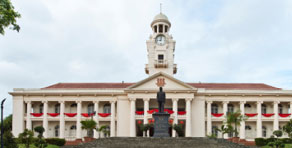 With a long history of 94 years, Hwa Chong has much to be proud of Known to be one of the top schools in Singapore that attracts outstanding students, Hwa Chong Institution has produced numerous scholars. To date, 53 Hwa Chong students have been awarded the President’s Scholarship, which is the most prestigious scholarship in Singapore.
With a long history of 94 years, Hwa Chong has much to be proud of Known to be one of the top schools in Singapore that attracts outstanding students, Hwa Chong Institution has produced numerous scholars. To date, 53 Hwa Chong students have been awarded the President’s Scholarship, which is the most prestigious scholarship in Singapore.
In the last decade, some significant changes have been made to the Hwa Chong landscape. The most notable of these are the merger of the long established Chinese High School and Hwa Chong Junior College and the creation of Hwa Chong International School, both of which took place in 2005. The merger came about as a result of the introduction in 2004 of the Integrated Programme that allows academically strong students to bypass the traditional O level examination. Today, both Hwa Chong Institution and Hwa Chong International School share the huge 70-acre campus at Bukit Timah Road. As an alumnus himself, Mr Jonathan Lee Hee Long has proudly witnessed this transformation in his role as Chairman of the Board of Directors of Hwa Chong Institution.
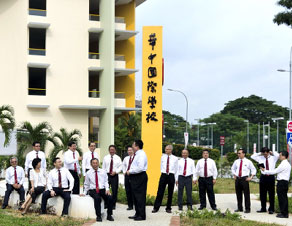 “We do what we can because Hwa Chong is important to us,” said Mr Lee, on the willingness of the alumni to give back to the school. “It could be because we have an excellent tradition of giving back to our alma mater. Be it donating money or setting aside time for our school, we do it. That’s how we keep the Hwa Chong spirit alive. We live out the Hwa Chong spirit and come together as a family in times of difficulty by supporting each other. And as Chairman of the Board, it is part of my responsibility to keep this family together. Giving back to our alma mater is a tradition that we are proud of and we intend to keep it that way.” “We do what we can because Hwa Chong is important to us,” said Mr Lee, on the willingness of the alumni to give back to the school. “It could be because we have an excellent tradition of giving back to our alma mater. Be it donating money or setting aside time for our school, we do it. That’s how we keep the Hwa Chong spirit alive. We live out the Hwa Chong spirit and come together as a family in times of difficulty by supporting each other. And as Chairman of the Board, it is part of my responsibility to keep this family together. Giving back to our alma mater is a tradition that we are proud of and we intend to keep it that way.”
Taking into account that the Hwa Chong family of schools is made up of different institutions, Mr Lee says it is noteworthy that the Board of Directors, together with the schools and alumni, work hand-in-hand to go forward together.
Role of the Board of Directors
“Altogether, there are about 5,000 students and 500 teachers in the Hwa Chong schools so the Hwa Chong family resembles a huge organisation. As such, like a Chief Executive Officer (CEO) of any organisation, being a principal can be quite a stressful job as both face immense pressure to do well. But that’s where the similarity ends as these two roles have distinctively different focuses. For example, a principal oversees not just the development but also the educational and cultural aspects of the school while a CEO simply focuses on the management, operation and profitability of the organisation,” said Mr Lee.
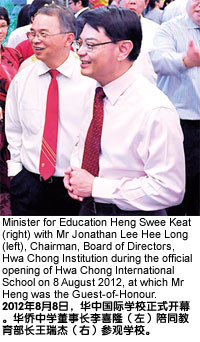 “Therefore, here at Hwa Chong, the Board of Directors does its best to assist the principal. We share that responsibility with the principal. Of course, without the Board, the principal is more than capable of running the school on his own, but we do help in whatever manner we can so that the principal can tend to more important matters. Most of our Board members come from a business background and their professional experience in finance, business and management comes in handy when the Board is called upon to help with construction and development projects, and the management of the school’s reserve funds. However, in the long run, it would be more ideal to have a full-time CEO working directly under the principal to manage the day-to-day operation of the school, the procurement processes and the finance and administrative work so that the principal can be more focused on his primary responsibility — education.” “Therefore, here at Hwa Chong, the Board of Directors does its best to assist the principal. We share that responsibility with the principal. Of course, without the Board, the principal is more than capable of running the school on his own, but we do help in whatever manner we can so that the principal can tend to more important matters. Most of our Board members come from a business background and their professional experience in finance, business and management comes in handy when the Board is called upon to help with construction and development projects, and the management of the school’s reserve funds. However, in the long run, it would be more ideal to have a full-time CEO working directly under the principal to manage the day-to-day operation of the school, the procurement processes and the finance and administrative work so that the principal can be more focused on his primary responsibility — education.”
Even though it has only been a short four years since he assumed his role as Chairman, Mr Lee has brought about changes that have transformed his beloved alma mater. He started with making a major change to the Board.
To ensure that board members are truly invested in the development of Hwa Chong, Mr Lee made it mandatory that 70 per cent of them must be former pupils of the School. Citing top American universities which have a high percentage of alumni in their schools’ management committees, Mr Lee strongly believes that having alumni serve in this capacity can make a world of difference.
“As a former student of the School, you would know what’s best for it. Sometimes, an alumnus might know better what the School needs than a principal who is not only new to Hwa Chong but is also a non-alumnus. Many of us spent our formative years in Hwa Chong so, naturally, we care for the School and would selflessly devote our time and effort to its development,” explained Mr Lee, who graduated from the Chinese High School in 1969.
As there are a number of alumni who are also board members, it naturally allows the Board to have a closer partnership with the Hwa Chong Alumni. After all, one of the main responsibilities of the Board of Directors is to foster a stronger bond between members of the Hwa Chong family — which comprises Hwa Chong Institution, Hwa Chong International School, the Board of Directors, the Board of Governors, Hwa Chong Senior Club, the Hwa Chong Alumni Association and the Hwa Chong Junior College Alumni.
“We get together and catch up with one another at the many school events. For this year’s Hwa Chong Family Chinese New Year Celebrations, we did things differently. In the past, we would just try to get as many alumni to attend the event. This year, however, we asked both Hwa Chong Institution and Hwa Chong International School to send 150 student leaders to attend the celebration too. By doing so, not only did these students get to interact with the alumni, but they also saw how loved the School is and were hopefully inspired to do the same. It is important for students to love and care about the School, and to give back to the School in their own way in future.
“If you look at the School’s history, there was a period of internal strife among members of the Hwa Chong family. That episode has only emphasised the need for us to work harmoniously together. And having an open communication allows that to happen. If there is a conflict in opinions, we work it out peacefully. We often meet over lunch to discuss school matters. We are, after all, a family. There are many opportunities that allow all of us to come together to work as one. All these things bring us closer together,” said Mr Lee.
The International School “Risk”
One of the most challenging projects Hwa Chong had to grapple with was when it started its International School in 2005.
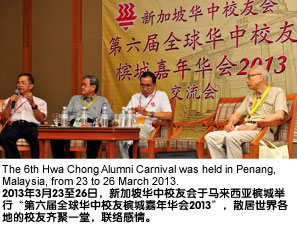 A concern was that Hwa Chong had a rich history and heritage, and was synonymous with academic excellence. Many worried that if the students of the international school did not perform well then the morale of the whole Hwa Chong community would be affected. Starting Hwa Chong International School therefore took a great leap of faith. A concern was that Hwa Chong had a rich history and heritage, and was synonymous with academic excellence. Many worried that if the students of the international school did not perform well then the morale of the whole Hwa Chong community would be affected. Starting Hwa Chong International School therefore took a great leap of faith.
Mr Lee recalled the lack of funding, “Back then, we could have taken the easy way out and not built the Hwa Chong International School. But we didn’t. The Economic Development Board gave us $6 million to start the school and even though it wasn’t much, we made do with it. We persevered.”
The first few years were challenging ones. “We channelled most of our energy and time into making sure that the International School is of a certain standard,” said Mr Lee. “We had to provide a strong foundation to ensure its success. There cannot be too great a difference in terms of academic quality between the International School and Hwa Chong Institution. Of course, it was tough in the beginning as unlike Hwa Chong Institution, which is a reputable institution, the International School had only just been established. Despite being part of the Hwa Chong family of schools, it still had to prove that it was as good as people expected it to be. If we wanted top students to apply to the International School, we needed it to be good. When we started to offer the International Baccalaureate Diploma Programme (IBDP) in 2009, it was a challenge to get well-qualified teachers who were experienced in teaching the IBDP, especially when we were a new school.
“Thankfully, back then, Hwa Chong Institution stepped in to help by sharing its facilities with the International School, albeit at a cost. We are also blessed that the School sits on such a large campus that there was enough land for the International School. If we had no land, there would most definitely be no International School. Ultimately, I feel that if it weren’t for then-principal, Mr Tooh Fee San, I don’t think the International School would be as successful as it is today. He was extremely patient and optimistic. ‘Give it time, we can make it,’ he used to say.”
Slowly but surely, Hwa Chong International School started to gain a reputation for excellence. In 2011, one in four students scored at least 38 points in the International Baccalaureate diploma examination — the maximum score is 45 points. After these results, the International School started to attract top students and now more than 20 applicants sit for its admissions tests every month.
“We are a local international school,” added Mr Lee. “Local Singaporean students make up half of our student population. Therefore, there is still a strong focus on the Chinese language in Hwa Chong International School, which can sometimes be the deciding factor for parents when they are choosing an international school for their children.”
Mr Lee has seen how the IBDP has changed lives and his great-niece is one example. She achieved a relatively low score of 180 points for the Primary School Leaving Examination and was only eligible for the Normal Academic stream in a local secondary school. After sitting for the O level examination, she joined Hwa Chong International School and graduated with a respectable score of 37 points in the International Baccalaureate diploma examination — a score that will get her into renowned universities.
“The IBDP did not just help to improve her results. It changed her from a girl who did not even dare to ask the price of food items in the market to a confident individual who opened a small store in a shopping mall while waiting to enter university. Recently, she even went to Thailand with her sister to buy clothes for her small venture. The IBDP teaches students to be confident and major changes are seen in them. It really is something. I am glad that Hwa Chong offers such an amazing programme to students,” remarked Mr Lee.
From a school that started with just 85 students in borrowed classrooms, Hwa Chong International School now has its very own building and even an outdoor sports complex. As part of its commitment to share its resources with the Hwa Chong family, the International School has consistently set aside a sum of money to donate to Hwa Chong Institution. It recently pledged $300,000 to Hwa Chong Institution for the building of the Hwa Chong Holistic Education Centre.
Infrastructural Expansion
Mr Lee also gave a glimpse into what the Board of Directors has been busy with, and what lies on the horizon for the Hwa Chong schools.
He thinks that it is the responsibility of the Board to enhance the learning environment for the students. As a result, over the last two years, the Board has been working closely with the Hwa Chong Alumni Association and Hwa Chong International School, to plan for further physical expansion of the school.
Mr Lee first made the announcement during Hwa Chong Institution’s 94th anniversary dinner in March — the current swimming complex is to be expanded and a four-storey building built next to the complex.
He said, “Without the cooperation of every member of the Hwa Chong family, these building plans would not have materialised. This project required all of us to work closely together as it involves so much effort — such as the planning, construction, coordination and fundraising — that it would be unfair for the principal to undertake such a huge and difficult project on his own.”
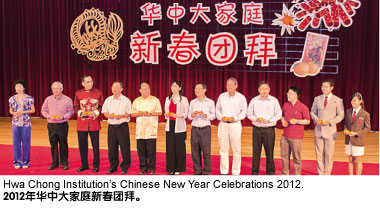 Coincidentally, the current swimming complex is in need of refurbishment. Therefore, the enhancements are timely. There are also plans to create a student hub and to add new classrooms and music rooms, which will mainly be used by Hwa Chong International School. Coincidentally, the current swimming complex is in need of refurbishment. Therefore, the enhancements are timely. There are also plans to create a student hub and to add new classrooms and music rooms, which will mainly be used by Hwa Chong International School.
As for the new building, it will have a large auditorium that can accommodate about 700 people, an indoor sport-cum-multipurpose hall, a basement carpark and an exhibition hall. The offices of both the Board of Directors and the Hwa Chong Alumni Association will be located in the new building. Once completed, the entire Hwa Chong family of close to 100,000 alumni and students will benefit from the improvements.
“It’s a win-win situation for all members of the Hwa Chong community, especially if we look at the benefits we will reap in the long run,” added Mr Lee.
This project will cost about $30 million and is expected to be completed in the next two years. About $20 million has already been secured by dipping into the School’s reserve funds and borrowing from the bank. The Board of Directors and Hwa Chong Alumni Association will continue to organise fundraising activities to raise the remaining $10 million so that construction work can begin in September as planned.
“When we organise these fundraising activities, it’s not just purely for the sake of raising money. We use these activities as an opportunity for us to work together and to show others what the Hwa Chong spirit is all about,” explained Mr Lee.
Raising the Standard of Mandarin in Hwa Chong
Even though he graduated 44 years ago, Mr Lee still remembers his Chinese teachers. They frequently spoke at length about the history of China and lessons were so interesting that Mr Lee still remembers them today. He fell in love with Chinese culture and language because of these inspiring teachers.
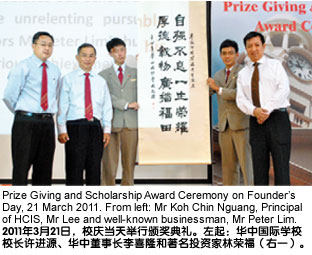 “These teachers taught the lessons in their own way. They didn’t teach in such a structured manner, with the goal of preparing us for the examinations. They taught us to love what they were teaching. They taught us to love learning. In fact, some of my classmates even asked these teachers not to teach using the textbooks but to just tell them more about world history,” said Mr Lee. “These teachers taught the lessons in their own way. They didn’t teach in such a structured manner, with the goal of preparing us for the examinations. They taught us to love what they were teaching. They taught us to love learning. In fact, some of my classmates even asked these teachers not to teach using the textbooks but to just tell them more about world history,” said Mr Lee.
“We do have a considerably higher standard of Mandarin here in Hwa Chong but it is not enough,” he maintained. “Our students have to score at least a B in the Chinese language in their Secondary 4 final year examination. If not, they have to repeat the subject at the pre-university level. And many of them do score an A but have they learnt to truly appreciate the Chinese culture?
“Some of them might not even have read any of the Four Great Classical Novels of Chinese literature such as Romance of the Three Kingdoms. It is worrying. Perhaps teachers should go beyond the textbook and try to interest their students in Chinese culture by teaching them about the various historical movements in China. More importantly, there needs to be a greater awareness of the essence of Chinese literature and its significance.”
Hwa Chong Arts Festival
Together with the Board of Directors, Mr Lee is also concerned about the type of student that Hwa Chong is producing. Hwa Chong consistently produces top scorers in the national and international examinations and even has an excellent humanities programme but he nevertheless feels that there can still be a greater emphasis on the arts.
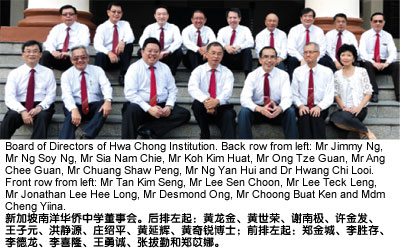 “Hwa Chong students are encouraged to take an active interest in the arts and many of them do eventually pursue their love for the arts in world-class universities, but I think we can do better to cultivate a greater love for the arts,” said Mr Lee. “Hwa Chong students are encouraged to take an active interest in the arts and many of them do eventually pursue their love for the arts in world-class universities, but I think we can do better to cultivate a greater love for the arts,” said Mr Lee.
To this end, there are plans to hold a week-long arts festival in the near future. Currently, Hwa Chong puts on many plays and concerts but Mr Lee thinks that more can be done. He has already spoken to the principals about his plans. Not only will the arts festival be an opportunity for everyone in the Hwa Chong community to come together, it will also be a way of nurturing a love for the arts among the students.
“Performances and concerts will be held, and students and teachers will transform the campus to reflect the liveliness and vibrancy of an arts festival. Students will be able to take the week off studying and just soak up the atmosphere and appreciate the arts. I hope that the festival will be a memorable one that students will talk about even after they have graduated, because sometimes, it’s not just about getting good grades. There are other things that matter more,” explained Mr Lee.
Character Development
In the same vein, Hwa Chong places character development above academic excellence.
Mr Lee said, “We have done well academically. That’s something to be proud of but it’s not always about getting an A. In time to come, people may forget your academic accomplishments, but not how you treat others. Cultivating a positive mindset is important as it can be exceptionally useful in trying situations. Your character, your self-discipline, your morals and your values are far more important than your grades. And it is the duty of the school to transmit the right set of values to the students because what one is taught in school affects how one behaves in the future. I think that the success of a nation is dependent on the type and quality of its schools. As such, if schools are well managed, the country will certainly prosper and can be guaranteed a brighter future.”
It is apparent that the idea of loyalty to one’s family, school and country is one which Mr Lee holds dear. “In today’s globalised world, it has become even more critical for students to be taught that values take precedence over everything else — they need to know what to do and what not to do. There’s a greater need for students to be grateful and loyal to their country in this highly globalised world. Some see Singapore as a company, a company that provides great economic opportunities and once these opportunities run out, they leave for another country. A country is a country. A country needs its people to stick by its side through thick and thin. If our country is in need and if we simply abandon it for greener pastures abroad, I think that is a failure of our education system.” said Mr Lee.
Therefore, Hwa Chong students are taught to honour and love their school, their family and their country — a philosophy that the late Mr Tan Kah Kee, founder of the Chinese High School, subscribed to himself. This will not only put them in good stead for future challenges, but also perpetuate the Hwa Chong spirit of giving back to one’s alma mater and by extension, to one’s country, a spirit aptly demonstrated by Mr Lee himself.
Guided by their motto — Ceaseless Quest for Excellence — the Hwa Chong family of schools is set to go from strength to strength in the years to come.
|